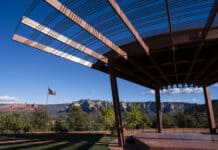Monday, Sept. 11, marks the 16th anniversary of the most devastating terrorist attacks on U.S. soil.
The Sedona Fire District will host a memorial ceremony at the 9/11 Memorial Plaza, located in front of Station 6 off State Route 179. The ceremony begins at 9:11 a.m.
The attacks were the start of global assault on the civilized world that has defined the geopolitics of our planet for the last decade and a half.
As terrible as terrorist attacks are for the victims and the psyche of those who witness them, the long-term effects are somewhat predictable. Rather than cause the collapse of multicultural liberal democracies, terrorist attacks actually create a sense of national unity and resilience that transcend cultural, political and religious lines.
After 9/11 and attacks in Madrid, London, Paris, Brussels and Boston, the people of the United States, Spain, Great Britain, France and Belgium openly displayed cross-cultural solidarity as petty domestic political disputes muted in the face of a more terrible foe that could strike anywhere, anytime.
“Boston Strong” — a spontaneous motto that arose after the 2013 Boston Marathon bombings — is perhaps the most succinct expression of this unity.
In 2004, 9/11 planner Osama bin Laden released a audio tape in which he declared his major plan to destroy the United States would be a “policy in bleeding America to the point of bankruptcy” by using tactics mujahideen fighters employed to battle the Soviet Union after it invaded Afghanistan in the 1980s.
Al-Qaida’s goal of “guerrilla warfare and the war of attrition to fight tyrannical superpowers” worked against the Soviet occupiers of Afghanistan because of the heavy military presence in the country and tacit support of an oppressed Afghan population against foreign occupiers.
The American invasion of Afghanistan and Iraq created the potential for a similar situation, but with some major differences, first and foremost being that permanent occupation or annexation was never an option for the U.S. in the same way it could have been for the Soviet Union, which shared a border with Afghanistan.
Secondly, unlike the centralized and controlled economy of the Soviets, the United States had then and still has the most robust economy in the world, decentralized and controlled by consumers. While U.S. military spending is large, it is only a fraction of our total economy.
The housing collapse and the Great Recession of 2008 caused far more economic disruption than any al-Qaida attacks, and that was a wholly American creation.
Even in targeted cities, a serious terrorist attack fails to cause long-term disruption. According to a economist from the University of California, Los Angeles, disasters like a terrorist attack in a specific city “tend to cause a short, steep descent followed by a quick upturn in the next quarter and even a possible short-term boost to levels above what would normally be expected, probably due to opportunity associated with the rebuilding process.”
Terrorist attacks, however, leave us with profound sense of fear and loss, even if we personally knew no one who was injured or killed. Remembering our fallen, honoring our dead and renewing our common bonds of national unity is the only way we can recover psychologically as a country.
We encourage all residents and visitors to attend the ceremony at Station 6 on Monday.
